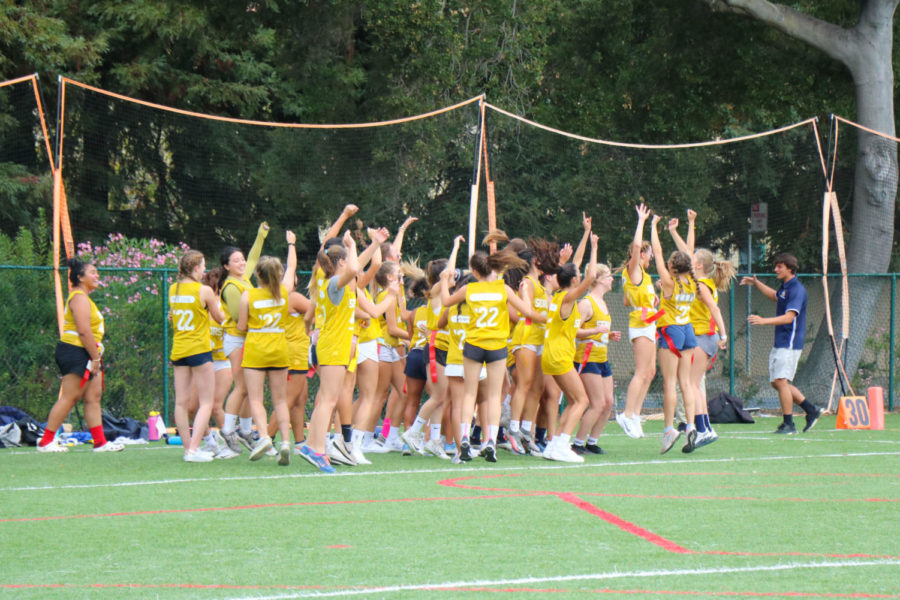While the week of Menlo’s Homecoming is filled with activities, dress-up days and pep assemblies to promote school spirit, the week’s main event is the Homecoming football game on Saturday. To bring the focus back to football, one of the lunches before Homecoming is traditionally devoted to a girls’ flag football game between the juniors and seniors. The boys football team serves as the coaches and many upperclassmen girls participate. While many see the tradition as a fun way to advertise the Homecoming game and create community within the school, others express a more critical perception of the tradition, classifying it as sexist and outdated. As both Coat of Arms staff members and players on the girls’ flag football team, we discuss the implications, both positive and negative, of the tradition.
Is girls flag football an inherently sexist tradition?
Erica: When Menlo changed the name from powderpuff to girls flag football, the game’s sexist roots didn’t simply disappear alongside the title. While the name change is for the better, it’s truly not much more than performative activism.
I think there’s no problem with girls playing a traditionally male sport or vice versa; in fact, I love when the boys don their volleyball uniforms for the annual Sugar and Spike game. The school heading to Wunderlich to support girls sports also offers great advertisement for girls teams in general. Yet problems arise when we “feminize” football with middle school sized fields and flags because girls are too “delicate” to keep up with the masculine game.
The tradition made great strides when it opened itself up to all female-identifying students and started erasing the gender binary that often associates itself with the game, but there is still more work that we can do to make the game more inclusive.
Alea: Although the title for girls flag football was previously “powderpuff,” which has a sexist connotation, it does not indicate that the tradition itself is sexist. Menlo simply adopted the name as a means to refer to the football game in which girls play and boys coach. If anything, I think that the tradition breaks down the stigma around girls playing a male-dominated game. By giving girls the opportunity to learn about and play a game that is considered more masculine, gender stereotypes are being broken.
I don’t find the tradition sexist at all, because it is just that: a fun tradition that happens annually on Spirit Week. While the game is played with flags and the practices aren’t taken as seriously, the girls aren’t treated “delicately” or seen as “fragile.” Instead, we are seen as strong and are celebrated for participating in the spirit activity. Girls flag football is just a light-hearted tradition that is supposed to be fun and spirited.
Should the football team take on the coaching responsibilities?
Erica: For the most part, I enjoy the student-run practices where the football team can show their leadership and expertise, similarly to the volleyball team during the annual Sugar and Spike boys’ volleyball game. Adding adults into the mix would make the game more structured, while also taking away from some of the chaotic fun. But, without supervision, a few of the coaches made the game about themselves and flexed their masculinity rather than letting the players shine.
Before the practices even began, a few of the boys made sexist comments in the team meeting that the senior girls should focus on running the ball instead of throwing because “girls can’t catch,” even though many participants were varsity athletes. Without supervision, the boys took the opportunity to make their friends laugh by providing sexist remarks. Many boys truly led the practices with unproblematic enthusiasm, but a select few chose to abuse their power, ruining it for everyone else. The football team can still be the main source of coaching and lead the game, but adults should also continue to monitor them to make sure they stop projecting an uncomfortable power dynamic and enforcing stereotypical gender norms onto the game.
Alea: One of my favorite parts of the girls flag football tradition is having the boys football team coach us. They are very committed to coaching and really invested in winning, which boosts team morale. I don’t think having adult supervision or actual coaches is necessary for just a spirit tradition. It’s supposed to not be taken as seriously as a real sport, so having the boys coach is a perfect way to keep it casual while still learning about the game.
I thought it was hilarious when the boys showed up to practice with their whistles and clipboards because it showed that they were dedicated to the game and planning to win, while also demonstrating the humor and spirit of the tradition. Personally, I did not experience the sexist remarks made by the boys, and believe that should be handled on an individual basis. I feel like having the boys coach creates an opportunity for bonding amongst peers. In my experience, practices are a pretty supportive environment because the boys are patient with the girls as they learn, and then they celebrate our progress. It is really heartwarming to see how excited everyone gets excited when the girls do a play right.
How should the positions be assigned?
Erica: This year, the senior boys sent out a Google Form where players could indicate their preferred offensive and defensive positions. It’s important that girls have the ability to choose their own positions because it improves the game when players can adapt the game to their interests and skills, especially with extremely limited practice times. So how do we break down playing time? With student coaches, play time often falls disproportionately to their friends, so only a select few get to participate in the activity, even when this game is meant to cater to everyone who wishes to participate. While it’s difficult to exactly state how the playing should be distributed, with only 40 minutes between the first snap and the last play, everyone should get a chance to shine.
This year, Ms. Ferrell instructed the boys to equalize playing time and that has provided opportunities for all the girls to give football a shot. At the end of the day, the flag football game offers a chance for the grades to bond, so let’s focus less on nepotism or meritocracies and just let everyone have a good time.
Alea: I agree with what Erica described about the Google Form and players being able to select their own positions. There is also an option for girls to be a “team mom” which entails bringing snacks to practices. This allows people to still participate without having to actually play in the game.
To me, it felt like everyone had an equal opportunity to participate in practice, as we broke off into different groups based on our positions and did a couple drills before running plays. We rotated the girls that went in and out, so everyone had a chance to be on the field. Regardless of skill level, all of the girls got to participate. While the goal of the game is to win, I do feel like inclusivity is considered and the coaches did a good job of giving everyone a chance to play. I foresee the game having a similar structure to practice, with girls subbing in and out so everyone gets to be on the field. Both the girls and boys want to win the game, so the girls are pretty flexible about playing time because it is a team sport; everyone is working towards the same goal.
Should we continue the girls flag football tradition?
Erica: Yes! The girls flag football game always stands out as a Spirit Week highlight and is a fond memory for many students. However, we also need to recognize that the tradition needs some amendments. In theory, the game represents a chance for junior and senior girls to bond and show off their athletic talents as a precursor to Homecoming, but too often the game twists itself into a sexist showing.
When we let the boys coach without any supervision, some unfortunately misuse their power and make sexist comments like “girls can’t catch” that really have no place at our school, or in the 21st century in general. I wish that wasn’t the case and we could have an unregulated practice experience, but, as of right now, there are still a few boys who haven’t demonstrated that they can handle that responsibility without making the girls game about themselves.
To rectify these issues and continue this spirited game, we need to have a teacher or coach also present at practices and meetings to remind the coaching staff that the game should be a chance for girls to shine, not for them to dominate on the sidelines in their self described “wife beaters.”
Alea: Absolutely, I think the tradition should continue. Friend groups and cliques are dissolved on the field, with everyone working together on the team in order to win. I think when signing up to participate, the girls are aware that the game is somewhat satirical, and it is all in good fun. There are only 1-2 practices before the game, so it really is just meant to be a lighthearted tradition. I also think that having the boys coach maintains the casual atmosphere and decreases stress amongst players. I think that adding adults or real coaches would take away from the tradition and make it more restrictive, which goes entirely against the whole concept of a fun girls flag football game.


